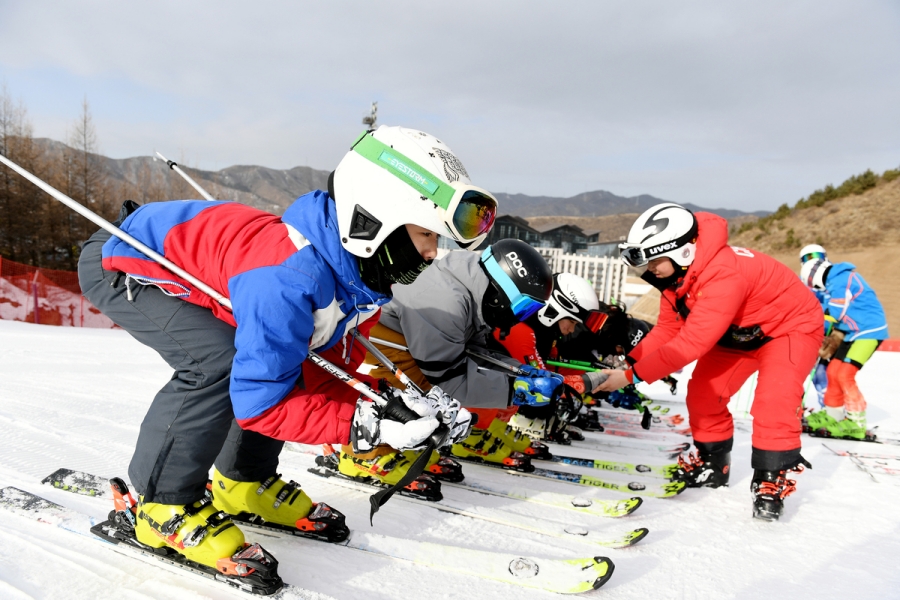Booming interest for ice and snow sports

Teenagers take ski lessons at a training base in the Beijing 2022 Winter Olympics' Zhangjiakou competition zone, North China's Hebei province, on Dec 15. [Photo by Chen Xiaodong/for China Daily]
Businesses benefit as tourism, equipment sales soar to 83.56 bln yuan despite pandemic's impact
In the countdown to the February start of the Beijing 2022 Winter Olympic Games, ice and snow tourism has picked up among Chinese consumers.
The Games are also expected to fuel more opportunities for businesses in related fields. With the new snow season beginning in China, enthusiastic skiers and snowboarders have been eager to get back on the slopes.
One drag on the demand for some travel related to winter sports may be the small number of new cases of COVID-19 that have popped up sporadically in some regions. But that will depend on the pandemic prevention and control situation this winter, industry experts said.
Beijing and Zhangjiakou in Hebei province have established a group of venues to provide services for the Winter Games, including the Beijing-Zhangjiakou high-speed railway. Over the long term, that infrastructure is expected to become additional assets for the country's tourism based on ice and snow.
The ski venues in Zhangjiakou, about 200 kilometers northwest of Beijing, will host the snow sports events of the Winter Games. In the past few years, the popularity of the ski resorts there has grown, although a few resorts will be closed for the Games next year.
A number of landmark Winter Games venues were designed with the idea of continuing to drive tourism after the Olympic and Paralympic Games.
"Those venues are expected to become new hot spots after the Games. Aside from traditional sports such as ice-skating and skiing, more innovative entertainment is expected to emerge and create new experiences for consumers," said Cheng Chaogong, chief researcher with the tourism research institute of Suzhou-based online travel agency Tongcheng-eLong.
"The improvement of transportation facilities and other infrastructure has further expanded the growth potential of the cultural and tourism sector in Beijing and in surrounding areas. Zhangjiakou is set to become a landmark destination for winter tourism, and the winter tourism market in Beijing will also get a boost," Cheng said.
Previously, most people who went to ski slopes in Beijing, Tianjin and Hebei province were locals. With major new development in the region aimed at serving skiers, those resorts have been attracting more tourists from other parts of China.
Those tourists aren't just from North China. People from Shanghai and Guangdong and Jiangsu provinces, for example, have shown a great deal of enthusiasm for the Winter Games and ice and snow tourism. The potential increase in the number of tourists from southern and eastern China is bound to give a boost to Beijing's tourism market, according to the Tongcheng-eLong institute.
The Winter Games events that tend to draw the greatest public interest include short track speed skating, speed skating, freestyle skiing, snowboarding and curling, experts said.
Ice and snow sports have become increasingly popular, and lots of people also like to participate in fun activities such as skipping rope in the snow, snow bowling and playing soccer in a field of snow.
Most of China's ice and snow tourism occurs in Northeast China, the Beijing-Tianjin-Hebei region and the Xinjiang Uygur and Inner Mongolia autonomous regions. Besides ski resorts, those regions also have important attractions such as ice sculpting, ice fishing and ethnic cultures, Tongcheng-eLong said.
Tianjin Airlines recently opened new flights to skiing destinations in North China and in northwestern and northeastern areas of the country to boost ice and snow tourism.
Copyright © The National Committee of the Chinese People's Political Consultative Conference.
All rights reserved. Presented by China Daily.
京ICP备08100501号-1

